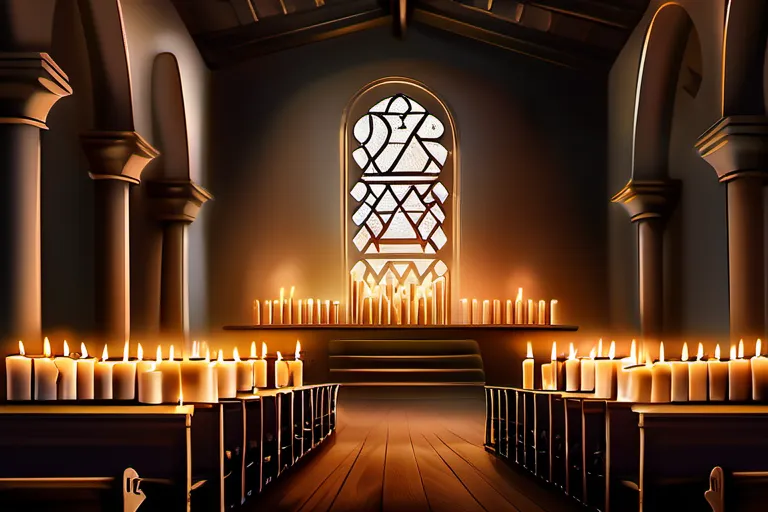Explore the origins, significance, and practices surrounding the Jewish Sabbath.
The Jewish Sabbath is a day of rest and spiritual connection for millions of people around the world. In this article, we delve into the history, traditions, and customs associated with this sacred day.
The Biblical Origins of the Jewish Sabbath
The Jewish Sabbath, Shabbat, has its roots deeply embedded in the pages of the Torah. Imagine stepping back into the creation story, where God worked tirelessly for six days and then rested on the seventh. Could this be a prototype for our own understanding of Shabbat? It’s almost as if the very act of creation serves as a blueprint for us to follow each week.
But how did these commandments transform into a weekly ritual that has been observed by Jews across generations and continents? The Ten Commandments, specifically the fourth commandment, states: ‘Remember the Sabbath day, to keep it holy.’ This commandment isn’t just about following rules; it’s about creating a space where the mundane becomes sacred.
Shabbat is like a wonderful oasis in the bustling sea of daily life. It offers us a chance to pause and reflect, to let go of our burdens, and to connect with the divine. Just as the sun sets on one day and rises anew each morning, Shabbat serves as a reminder that everything has its cycle, and rest is not just an option—it’s a necessity.
Through rituals like lighting candles, singing hymns, and enjoying a special meal, families come together to create a sense of unity and peace. These practices are more than just traditions; they are the threads that weave the fabric of Jewish identity and community life. Each act performed on Shabbat is a piece in this intricate tapestry, contributing to its beauty and strength.
The Sabbath truly embodies a balance between the physical and spiritual worlds. It’s not just about refraining from work but about finding joy in simplicity, cherishing relationships, and allowing ourselves to be enveloped by the sacredness of the moment. In essence, Shabbat is a journey of transformation, inviting us to experience the divine in our daily lives.
So, as we reflect on the biblical origins of the Jewish Sabbath, let’s consider how these ancient teachings can guide us even today. How might your own life be enriched if you took a moment each week to pause and connect with something greater than yourself? The answer may lie within the very essence of Shabbat.
The Significance of the Jewish Sabbath in Jewish Life
The Jewish Sabbath, also known as Shabbat, holds a unique and profound place in the lives of Jews around the world. It’s not just a day of rest; it’s a gateway to spiritual rejuvenation and a bond that ties together families and communities. Why is the Sabbath so significant? Could it be because it serves as a constant reminder of God’s creative power, much like how the sun rises and sets daily?
For many Jews, Shabbat is more than just a day off work or school; it’s a sacred time dedicated to rekindling spiritual ties. Imagine a candle flickering in the dark, lighting up your home with its warm glow – that’s the essence of Shabbat for many. It symbolizes hope and renewal, much like how a fresh start after a storm brings new life.
During Shabbat, Jews refrain from laborious activities to focus on spiritual pursuits and family bonding. This practice of rest and reflection is akin to taking time out of the hectic river of daily life to pause and breathe deeply. It’s a chance to reconnect with loved ones over meals rich in tradition and meaning, where stories are shared and hearts are opened.
The Sabbath also strengthens communal bonds. Think about it: wouldn’t it be wonderful if every community had a day set aside for coming together, sharing, and supporting one another? Shabbat provides that very opportunity. It’s a time when synagogues overflow with worshippers, homes welcome guests, and the atmosphere is charged with joy and camaraderie.
Moreover, the Sabbath is a bridge between the divine and the human. By observing its restrictions, Jews honor the sanctity of creation, much like how every part of nature serves a purpose. It’s a reminder that even in our bustling lives, there are moments meant for rest, reflection, and renewal.
So, why does this day hold such importance? Because it’s more than just following rules; it’s about experiencing the divine presence in everyday life, finding peace amidst chaos, and building connections that last a lifetime. The Jewish Sabbath is not just a religious observance but a way of life that enriches every aspect of existence.
The Preparations for the Jewish Sabbath
The prelude to the Jewish Sabbath is like setting the stage for a grand performance, where every detail is meticulously prepared. Imagine walking into your home on Friday afternoon; you find yourself in a whirlwind of activity that culminates in the hallowed hour when the sun sets and the Sabbath descends.
The first act begins with the lighting of candles. These small flames, as if casting spells from ancient lore, bring a soft glow to your home. The significance behind this ritual is profound; it symbolizes the transition from the mundane to the holy, much like how a stage transforms from its everyday setting into a venue for magic.
As you light these candles, think about the blessings recited over them. They are not just words but threads woven into the fabric of your family’s tapestry, connecting you to generations past and present. The Kiddush, or blessing over wine, is another ritual that brings the family together. It’s as if a shared sip of this blessed liquid unites everyone in a momentary suspension from their daily lives, drawing them closer.
Then comes the washing of hands, a simple act with profound meaning. It’s like starting anew, cleansing your body and soul to prepare for the sanctity that awaits. This ritual is not just about hygiene but about spiritual purification, making each member ready to receive the blessings of the Sabbath.
Each preparation, from lighting candles to washing hands, builds a wall around you, creating a sanctuary within your home. These acts are not mere customs but gateways into a world where rest and reflection reign supreme. As the sun sets, the house becomes a microcosm of the spiritual realm, preparing for the divine presence that is about to fill it.
The Observance of the Jewish Sabbath
The observance of the Jewish Sabbath is a profound and intricate ritual that transcends simple religious practice, embodying a deep spiritual connection to tradition and community. Imagine stepping into a time capsule where modern life pauses for a moment, allowing individuals to reconnect with their heritage and engage in sacred rituals. How often do you take a break from your daily grind just to reflect on the essence of your existence?
During the Sabbath, or Shabbat as it is known in Hebrew, Jews refrain from work to create a day of rest and spiritual rejuvenation. This practice is not just about stopping activities like cooking or cleaning; it’s a complete cessation of labor that transforms the home into a sanctuary for peace and reflection. It’s almost like hitting the pause button on all the noise and rushing of everyday life, inviting in a sense of calm and harmony.
Attending synagogue services is another crucial aspect of Shabbat observance. These services are not just religious gatherings but community events that bring together families and friends to celebrate this special day. The atmosphere is warm and inviting, filled with the melodies of prayer and the aroma of freshly baked challah. As you step inside, you might wonder how these rituals have survived for centuries, passing down from one generation to another like a precious heirloom.
The centerpiece of the Sabbath meal is the festive dinner that often features two loaves of bread, symbolizing the double portion of manna given to Israelites on the sixth day. The family gathers around the table, breaking bread together in a gesture of unity and joy. This meal is more than just sustenance; it’s a moment of shared storytelling and laughter, weaving memories that last beyond the night. How often do you find yourself savoring meals with loved ones, creating cherished moments that bring families closer?
Shabbat is not merely about abstaining from work but embracing the richness of life through rest, reflection, and community. It’s a reminder to pause, reflect, and celebrate the simple joys that often get overshadowed by our busy lives. As you light the candles at home or attend your synagogue service, consider the profound impact this ancient tradition has on shaping not just religious beliefs but also personal values and community bonds.
How do you find moments of stillness in your life to connect with what truly matters? The Jewish Sabbath offers a unique opportunity to pause, reflect, and rejuvenate. It’s more than a day; it’s a way of life that continues to inspire generations.
In this modern world, the observance of Shabbat remains a powerful reminder of tradition and faith, weaving a tapestry of history and continuity through every candle lit, prayer said, and meal shared.
The Modern Observance of the Jewish Sabbath
How does one navigate the modern world while holding onto the traditions of the Jewish Sabbath? The challenges are many, yet the observant Jews continue to find ways to celebrate this sacred day in a way that resonates with today’s lifestyles and environments.
The Sabbath is more than just a day off; it’s a time of rest and reflection. For many Jews, observing the Sabbath means adhering strictly to the commandment to refrain from work, which can be quite restrictive when living in a society that values productivity and efficiency. How do they balance these two worlds? By finding creative solutions—scheduling meetings or errands before or after Shabbat, working on projects that don’t require creative thought during the week, or even taking breaks at their workplace to honor the day.
Traveling poses another challenge. The ability to connect with a synagogue or community can be limited when far from home. Yet, people find innovative ways to observe. They might travel with a portable mezuzah, light a menorah in their hotel room, or even create a makeshift Sabbath table wherever they are staying.
The digital age also presents its own set of hurdles. With smartphones and laptops at our fingertips, how can one truly disconnect? Some use apps that block distracting websites during the day or simply turn off their devices entirely to immerse fully in the spiritual experience. Others find peace by setting aside time each morning for a brief meditation or prayer before engaging with any technology.
Despite these obstacles, the spirit of the Sabbath continues to thrive. It’s like a beacon, guiding Jews through the chaos of modern life back to a place of tranquility and meaning. The Sabbath becomes not just a break from work but an opportunity for rejuvenation, connection with loved ones, and deepening one’s faith.
So, how do you ensure that the Jewish Sabbath remains relevant in today’s fast-paced world? By embracing tradition while adapting to change, finding personal ways to honor this holy day, and connecting with a community that shares your values. The Sabbath is about more than just refraining from work; it’s about creating moments of joy, peace, and spiritual growth amidst the challenges of modern living.
The Spiritual Dimension of the Jewish Sabbath
Imagine stepping into a tranquil haven, where time slows down and the hustle and bustle outside fades away, leaving you in the presence of Sunday, the Jewish Sabbath. How does this day differ from any other? The answer lies deep within the spiritual dimension that makes it unique.
The Sabbath is not merely a day off; it’s a sacred break from the mundane. It’s like hitting pause on life’s fast-forward mode, allowing you to reflect on your journey. Just as a computer needs a reboot to clear its cache and refresh its performance, the human spirit requires a similar reset. How often do we get lost in our daily routines without taking a moment to check in with ourselves?
The Sabbath is a time for introspection, akin to peeling back layers of an onion to uncover the core of your being. It’s about recognizing the presence of the Divine in every aspect of life, from the mundane tasks like preparing food to the profound moments of connection with loved ones.
Meditation plays a crucial role during this time. Think of it as a personal sanctuary where you can communicate directly with God. It’s not just about quieting the mind but also about tuning into the spiritual currents that flow around us, making each moment feel like a sacred exchange.
The Sabbath provides an opportunity to build bridges between different aspects of life. It’s like weaving a tapestry where every thread—prayer, study, family time—is carefully chosen and interwoven to create something beautiful and meaningful. How often do we find ourselves in situations where our spiritual practices clash with the demands of daily life? The Sabbath is a reminder that these elements can coexist harmoniously.
Ultimately, the spiritual dimension of the Jewish Sabbath invites us to embrace a deeper sense of purpose and fulfillment. It’s about finding balance between the sacred and the secular, the divine and the human. In this space, we are reminded that every action, every word, carries significance and can contribute to a greater whole.
Conclusion
 By understanding the importance of the Jewish Sabbath, we gain a deeper appreciation for the rich cultural heritage and values that it represents.
By understanding the importance of the Jewish Sabbath, we gain a deeper appreciation for the rich cultural heritage and values that it represents.











